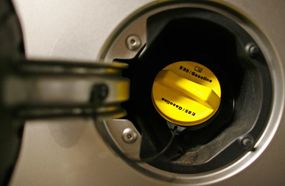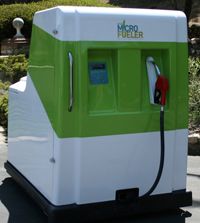Ethanol Production Costs
The costs associated with home ethanol production have so many factors involved that concrete numbers are impossible. Here's a guide to the steps of making ethanol so that you can make the calculations yourself:
- Feedstock: If you're using waste material such as sawdust or grain, this is free. If you're growing feedstock, you need to calculate the price of seeds as well as the time and energy it takes to grow and harvest the crop. For example, switchgrass takes much less time and water to grow than corn.
- Equipment: A solar ethanol still can usually be made with simple materials often found around the house. Building a boiler and a reflux column can cost anywhere from $30 in blueprints and about $50 in materials, to around $200+ for a fully-built reflux still on eBay. If you really want to make it easy on yourself, you can buy an EFuel100 MicroFueler for about ten thousand dollars.
- Gasoline: You need to factor in the price per gallon of gasoline. You'll be required to mix this with your ethanol. For example, if you're making E95 (95 percent ethanol, five percent gasoline) with gasoline that is priced at $4 per gallon, you'll be mixing 20 cents worth of gasoline into each gallon of ethanol you produce.
- Output: The more ethanol you get out of your still and the more efficient you become at distilling, the more your costs will go down.
The government likes to know when and where people are brewing ethanol. To be able to legally distill, in the United States you need to file a permit with The Alcohol and Tobacco Tax and Trade Bureau (TTB). The permit is free. The application is five pages long and takes about a month to process. Authorities can stop by at any time to inspect your still and make sure that you're not drinking the product. While you can make 100 percent ethanol (E100) to run in your vehicle, the best way to assure the authorities that your homemade ethanol is used for fuel is to create a mix of about 4 to 6 percent gasoline per gallon of ethanol.
Advertisement
Ethanol is actually pretty safe to make--some say it's even safer than going to a gas station. If your still is made correctly, everything should be self-contained and well-regulated. That being said, there is always Murphy's Law. The best way to stay safe is to remember that the point of ethanol in a combustion engine is to explode -- you should respect that. Following safety instructions is important. Pay special attention when installing vents, timers and over-boil regulators. Most importantly, never smoke near your ethanol still.
Any gasoline engine can run on small amounts of ethanol. If you're going to use large quantities of ethanol (like E85), your vehicle will require an E85 conversion kit. You can buy these kits online from several retailers. They cost anywhere from $100 to $1,000 depending on the technology and how comfortable you are installing them yourself.

Some vehicles, called flex-fuel vehicles, can run on ethanol already. In fact, millions of cars on the road can run on ethanol, and their owner's don't even know it. To find out if your vehicle is flex-fuel compatible, check your owner's manual or the inside of your fuel filler door for an ID sticker or some other indication that your vehicle is E85 compatible.
Small engines like lawnmowers, hedge trimmers and chainsaws don't need to convert anything to operate on ethanol; however, you may notice a smaller energy output. Some people find ways to get more output by playing with choke valves and fuel additives.
Making your own fuel can have a lot of advantages. These can include tax credits and HOV lane access -- you must display alternative-fuel plates -- to the satisfaction of knowing where your fuel came from. You should always follow the safety instructions, but don't forget to be creative and find ways to incorporate ethanol into more than just your car.
If you want to learn more about making your own ethanol, then follow the links below.
Related HowStuffWorks Articles
More Great Links
Sources
- AAMCO. Eco-Green Business. http://www.aamco.com/ecogreen/e85FleetConv.html
- Alcohol and Tobacco Tax and Trade Bureau (TTB) - U.S. Department of the Treasury. May 2007. http://www.ttb.gov/forms/f511074.pdf
- Bioenergy Feedstock Information Network. "Biofuels from Switchgrass: Greener Energy Pastures." http://bioenergy.ornl.gov/papers/misc/switgrs.html
- Bureau of Alcohol, Tobacco, Firearms and Explosives (ATF) Online. http://www.atf.treas.gov/
- Flex Fuel US. "Alternative Fuel Incentives." http://flexfuelus.com/ALTERNATIVE-FUEL-INCENTIVES
- Fuel Economy. "Flex-fuel Vehicles." http://www.fueleconomy.gov/feg/flextech.shtml
- Internal Revenue Service (IRS). "Certain Fuel Mixtures and the Alternative Fuel Credit." March 2008. http://www.irs.gov/pub/irs-pdf/f8849s3.pdf
- Popular Mechanics. "Micro Fueler Is First Ethanol Kit for Brewing Backyard Biofuels on the Cheap." 05/08/2008. http://www.popularmechanics.com/blogs/science_news/4262690.html
